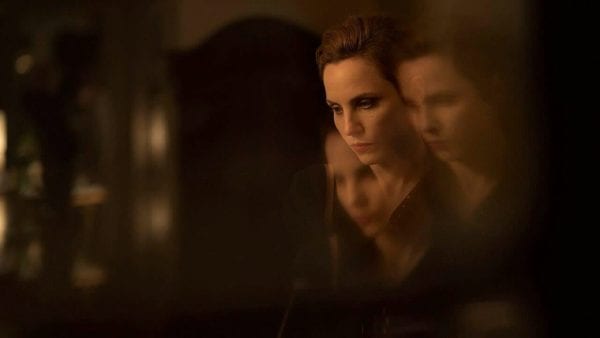Nina, 2018.
Directed by Olga Chajdas.
Starring Julia Kijowska, Eliza Rycembel, Andrzej Konopka, Maria Peszek, Katarzyna Gniewkowska, Tatiana Pauhofová.
SYNOPSIS:
Unable to have children, a teacher and her husband search for a suitable surrogate. Eventually, they meet a young woman who appears to meet their very specific criteria; but feelings soon arise that might complicate matters.

There is a sense of unevenness to Olga Chajdas’ debut feature about surrogacy and sexual liberation that is altogether unshakeable.
From the get-go, Nina – an arthouse-flavoured Polish language film that premiered at 2018’s Rotterdam Festival – feels unassured in the story it wishes to tell. Despite its title, the film’s opening exchanges oddly take place in the absence of the titular teacher, but instead focus on Magda (Rycembel): a free-spirited young lesbian whose relationship with airline stewardess Ada (Pauhofová) is punctuated by sexual encounters with numerous other women. We soon meet Nina who, by contrast, appears emotionally reserved and languishing in an unhappy marriage to husband and mechanic Wotjek (Konopka).
Struggling to conceive, the pair’s search for a surrogate seems to be in vein, until Nina inadvertently (but conveniently) reverses into Magda’s car near Wotjek’s garage. Struck by her beauty, Nina and Wotjek set their sights on seducing Magda into agreeing to carry their child. Surrogacy ultimately proves to be a mere side element to the story, however, as Nina struggles to repress her inner desires and soon finds herself embroiled in a secret romantic relationship with Magda.

But this is, on the whole, a largely predictable, unremarkable affair. In trying to juggle adjoining sub-plots that often conflict thematically, Nina inevitably suffers from both the narrative paths it fails to explore and the overriding questions it leaves unanswered. Chajdas does, however, handle the film’s more tender, erotically charged moments with confidence and intimacy; combining a gauzy aesthetic with a raw undercurrent that never feels unnecessary or objectifying. Equally commendable are the neat visual motifs that pop up along the way – Natalia Bażowska’s ‘Birth Place’ exhibition, for instance, which boasts a womb large enough to fit people inside, plays a significant role in the film’s exploration of sexual re-birth. However, narrative fleshing elsewhere, such as Nina’s classroom discussions of Jean Luc-Godard’s Contempt, feels tacked on and seemingly in place solely to give the film a rather needless additional allegorical edge.
Just like a man-made, artistic imagining of a sexual organ, Nina fails to wholly distance itself from something that feels a little too artificial. Chajdas never truly convinces us of the deep-felt romantic chemistry between her two leads, while the film’s few male characters – aside from rather cleverly being associated with broken things (cars; flower pots; marriages) – eventually show themselves as predictably dislikeable and threatening. And in the same way the narrative could benefit from some sustained focus, the film’s run time feels equally in need of finer tuning. At over two hours, Nina feels hard-pushed to fill such length, and so frustratingly falls back on repetition and unnecessary elongation to help hammer home points that need no further elbow greasing.

Although it isn’t likely to garner huge exposure outside the LGBQT circuit, as feature debuts go, Nina is a suitably intimate and intricate tale of awakening, but sadly too often gets bogged down by a heavy-handed propensity to over-complicate.
Flickering Myth Rating – Film: ★ ★ ★ / Movie: ★ ★
George Nash










